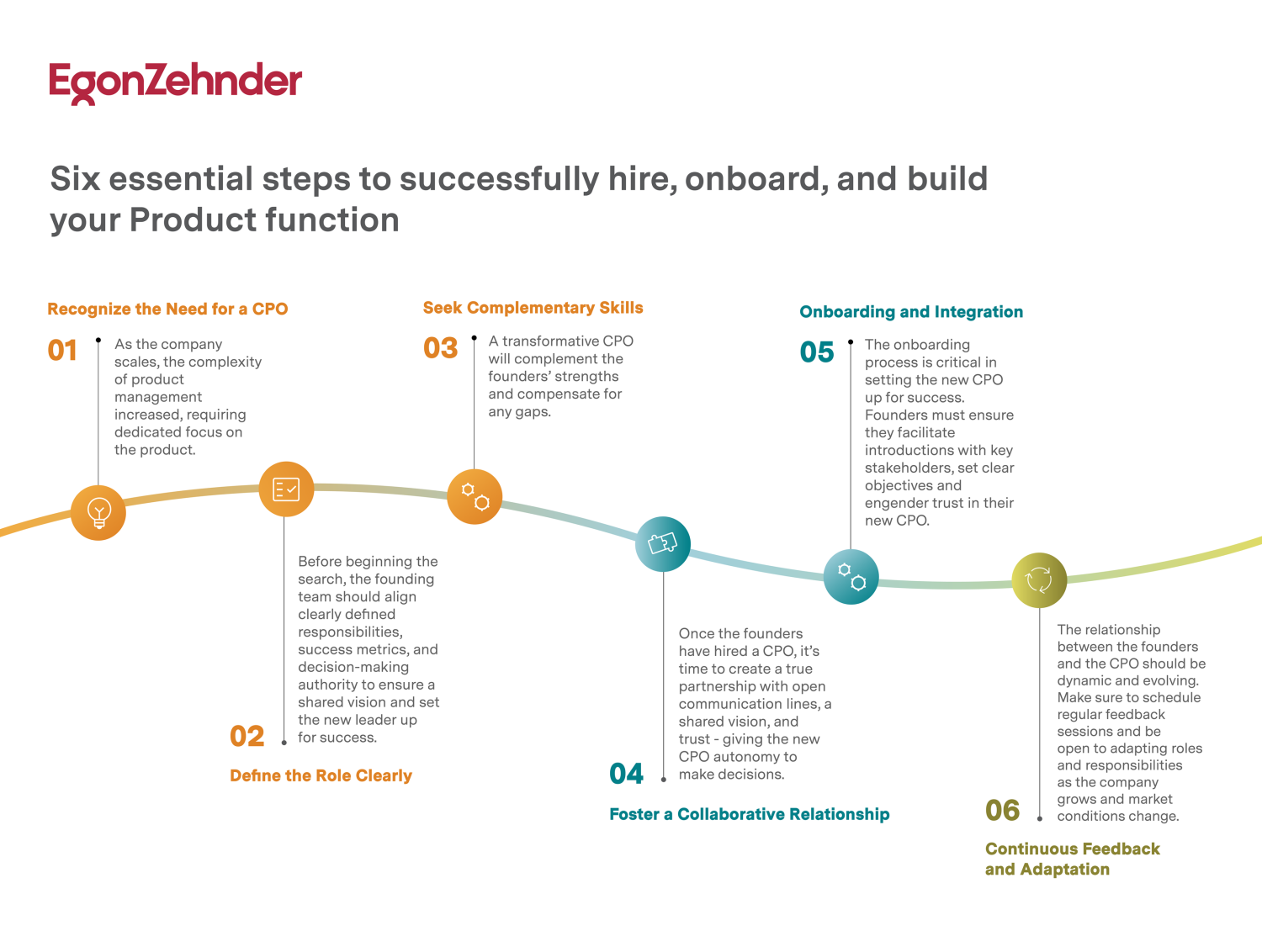For many startup founders, the product is their brainchild, the tangible manifestation of their vision, and the cornerstone of their company’s success. As the company grows, however, the demands on a founder's time and expertise expand exponentially. One of the most critical and challenging decisions a founder faces is whether to hire a Chief Product Officer (CPO) and when. This decision is not merely about filling a role; it's about entrusting someone else with the stewardship of the product vision that has been so central to the founder's identity and the company's trajectory.
Here’s how founders can thoughtfully approach this pivotal transition:
1. Recognize the Need for a CPO
The first step is acknowledging when it’s time to bring in a CPO. Signs that it might be time include:
- Scaling challenges: As the company scales, the complexity of product management increases. Multiple product lines, larger teams, and more sophisticated customer needs require dedicated focus.
- Founder overload: If the founder is spread too thin across various responsibilities, the quality of product oversight can suffer.
- Market dynamics: Rapidly changing market conditions and competitive landscapes may demand a level of expertise and focus that a founder can't provide alone.
- Succession planning: CPOs are often contenders for the CEO role if/when the time comes. As founders begin to think about their own next steps, bringing on board a CPO to transition the product vision to is a logical next step.
2. Define the Role Clearly
Before beginning the search, it’s crucial to have a clear and detailed job description. This should include:
- Responsibilities: Define what the CPO will be accountable for, such as product strategy, roadmap development, team leadership, and cross-functional collaboration.
- Expectations: Set clear expectations for outcomes and milestones. What does success look like in this role?
- Authority: Clarify the level of decision-making power the CPO will have. Will they have the final say on product decisions, or will they collaborate closely with the founder?
3. Seek Complementary Skills
A successful CPO should complement the founder’s strengths and compensate for any gaps. Key qualities to look for include:
- Strategic vision: The ability to see the big picture and align product strategy with business goals.
- Execution excellence: Proven track record of bringing products from concept to market successfully.
- Leadership: Strong leadership skills to manage and inspire the product team.
- Customer focus: Deep understanding of customer needs and the ability to translate them into product features.
4. Foster a Collaborative Relationship
Hiring a CPO doesn’t mean the founder steps away from product entirely. Instead, it’s about creating a partnership. Here’s how to foster a collaborative relationship:
- Open communication: Establish regular check-ins and open lines of communication to ensure alignment and address any concerns promptly.
- Shared vision: Work together to develop a shared vision for the product. This ensures that the CPO is not just executing tasks but is genuinely invested in the product’s success.
- Trust and autonomy: While it’s important to stay involved, it’s equally crucial to trust the CPO’s expertise and give them the autonomy to make decisions.
5. Onboarding and Integration
The onboarding process is critical for setting the CPO up for success. Key steps include:
- Immersion: Provide a deep dive into the company’s history, culture, and product journey. This helps the CPO understand the context and nuances of the product.
- Stakeholder introductions: Facilitate introductions with key stakeholders, including team members, customers, and partners.
- Clear objectives: Set clear, achievable objectives for the first 90 days to help the CPO gain quick wins and build momentum.
- Engender trust: Make it clear to other members of the executive team and key stakeholders that the CPO is now in charge of the product vision and execution. If the founder has hesitations about handing over the reins, it will be clear to others as well.
6. Continuous Feedback and Adaptation
The relationship between the founder and the CPO should be dynamic and evolving. Regular feedback sessions can help address any issues early and ensure ongoing alignment. Be open to adapting roles and responsibilities as the company grows and market conditions change.
Setting Up Your CPO for Success as the Company Scales
Hiring a Chief Product Officer is a significant milestone for any founder. It requires careful consideration, clear communication, and a willingness to share the reins of product leadership. By approaching this transition thoughtfully, founders can ensure that their product vision continues to thrive, even as they scale new heights and tackle broader business challenges. The right CPO can not only safeguard the founder’s vision but also elevate it, driving the company towards greater innovation and success.






